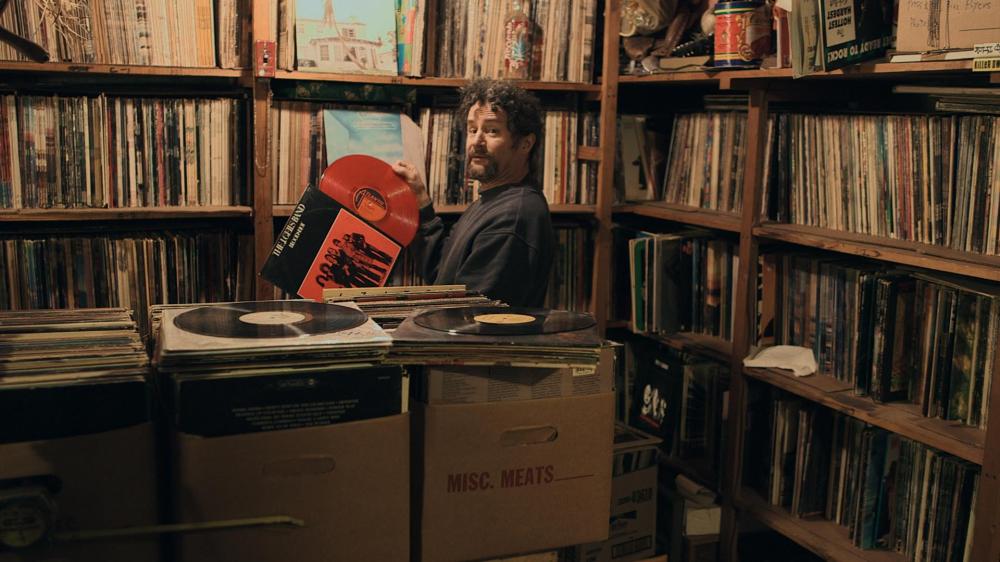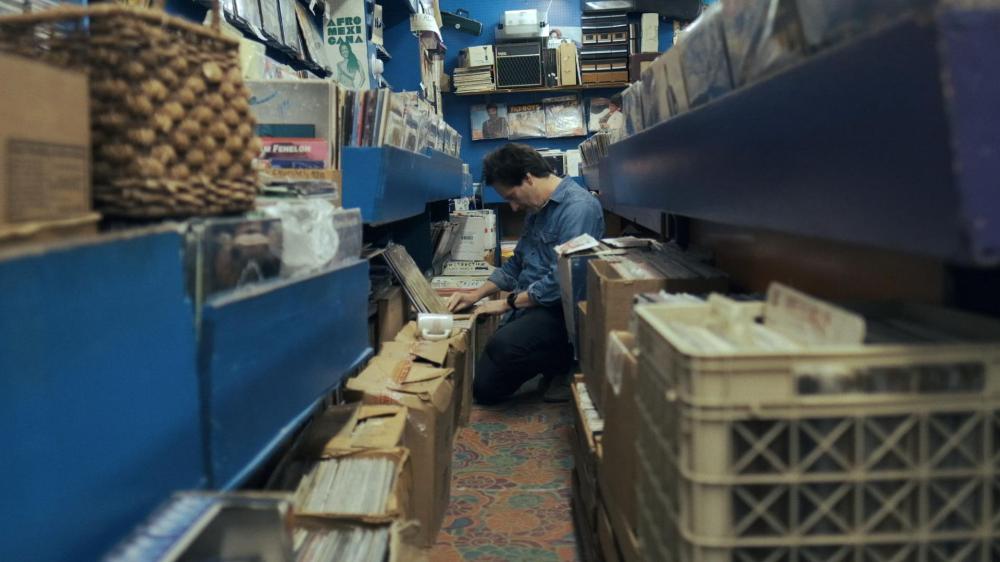Chris Wilcha begins his documentary Flipside at an art gallery, where photographer Herman Leonard is exhibiting some of his work. Leonard is most well-known for his stunning photographs of some of the greatest jazz musicians who ever lived, and gives the viewer a mini tour of images of Nat King Cole, Duke Ellington, and others. He’s also, as Wilcha’s ever-present voiceover narration states, dying of cancer, with little time left. You would be right to think, entering Flipside with no knowledge of its premise, that Leonard is the subject of the film, but Wilcha completely dismantles that notion within a couple of minutes when he states that this documentary about Leonard that he was commissioned to make is one of many projects he never completed.
In fact, the entirety of Flipside works to dismantle our idea of what a documentary can be and often is; even its title, taken from the name of a record store in his hometown that plays a central role in Wilcha’s film, contains a double meaning, as the script is essentially flipped, finding Wilcha culling from the B sides of his various abandoned past projects (and current fixation with Flipside, which appears to be equally bound for nowhere) as opposed to crafting a polished work exploring a singular subject. That’s not to say that Flipside is messy; it comes from too skilled a filmmaker for its seemingly disparate parts to not be neatly edited into a cohesive whole. But that is what makes it so transfixing, and also surprisingly moving.

After the Herman Leonard cold open, Wilcha breezes through his biography, an entire life unfolding in a collage of old photos, home movies, and film clips. Like so many Gen-Xers, Wilcha sought a creative existence outside of the capitalist mainstream— but had to work a soul-crushing corporate desk job in the meantime. Adopting the imagined perspective of a sort of corporate spy, Wilcha filmed his day-to-day routine while working at the music retail company Columbia House and made a documentary feature about it titled The Target Shoots First. Wilcha’s scrappy film about his boring life put his name on the map; soon after, he directed a TV documentary for MTV, and then helmed the This American Life TV series. He got married, had two kids; was hired by Judd Apatow to direct a behind-the-scenes documentary about his film Funny People, so moved him and his family from New York to Los Angeles; found that after the Funny People job was over he couldn’t find any fulfilling work, and so began paying the bills by directing commercials for the exact sort of corporations he’d sworn against (“selling out,” as Wilcha says), trying and failing to get project after project off the ground in the meantime. These never completed films include a portrait of writer Starlee Kine at work, who comes down with an incurable case of writer’s block soon after production began (and that affliction is not particularly cinematic, as it turns out), and This American Life producer Ira Glass’ efforts to mount a live musical at a moment when his private life was in turmoil. “Another hard drive on the shelf” becomes the recurring image and phrase Wilcha employs each time another project he started falls apart.
And then of course, there’s Flipside Records, the Pompton Lakes, New Jersey shop where Wilcha worked for a brief time while he was in high school. The storefront, marked by a large sign proclaiming “Records & Tapes” that’s iconic to locals, is a staple on the small town’s main street. Its owner, Dan Dondiego, may not be as high-profile a figure as many of Wilcha’s other subjects, but he’s every bit as interesting a character. He purchased the shop and all its inventory from his cousin on a whim, and throughout the 80s and 90s, Flipside, its crowded aisles and shelves stacked with records and other pop culture paraphernalia (that’s not to mention all of the inventory Dondiego keeps downstairs that he doesn’t have room for out on the floor), was a popular hangout for outcast teens like Wilcha. Since then, Flipside’s story has turned into a familiar one for many small businesses: as the adjoining shops in Pompton Lakes’ downtown area close their doors, Flipside remains open, but barely. Dondiego is lucky on some weekdays if he makes one sale.

Approaching middle age while sitting at a career and creative juncture are likely the strongest impetus for Wilcha to return to Flipside. Nostalgia can serve as a bottomless well of inspiration as well as reflection, and years after promising to make a film that may help raise Flipside’s profile in the digital age (for a while, it becomes one of Wilcha’s many hard drives on the shelf), he approaches the project with renewed vigor. Inspiration and reflection may actually be the best summation of the themes that emerge from the hodge-podge of new and old material that Flipside consists of. We see Wilcha continually reflecting back on his life and the choices that got him to where he is now, whether he is physically sifting through the boxes of items he’s accumulated since childhood, still sitting in a closet in his parents’ home, or in a playful interview with Apatow, when he confronts him with the knowledge that he inadvertently broke up his family when he brought him out to LA for the Funny People doc (Apatow serves as an executive producer on Flipside, so there’s clearly no bad blood there). And inspiration comes into play because, well, that’s sort of what the whole film is about: recognizing and coming to terms with your failings, while allowing them to inform your successes. Surely, it’s no coincidence that almost all of Wilcha’s subjects are creative people, who have gone through the same trials he has. It’s the common thread that he finds running through all of these fragments as he resurrects his unfinished projects, giving them a new life as a part of this film.
Not everything Wilcha tosses into the Flipside pot entirely lands; a sort of battle of commerce between Flipside and a new-fangled record store that coincidentally opens a block away is amusing but routine, as Wilcha contrasts Flipside’s cluttered digs (we catch a glimpse of a box labeled “CDs with shitty packaging”) and analog workflow (Dondiego adds up each customer’s purchases by hand, slowly) with the other shop’s sparser but neatly-ordered collection and quick, Square point of sale system (although there’s a bit of absurdity here, as the owner repeatedly iterates to Wilcha that his shop is technically a bookstore, they just make the majority of their profit off of record sales). Some of Wilcha’s narration also reads a little clumsily, putting words to feelings that are already present in the footage. But it’s hard to deny Flipside’s charm, both as a frequently funny crowd-pleaser and a dizzying autobiography, but also as a tender musing on art and life. With Flipside, Wilcha has managed to recreate the feeling of flipping through a crate of dusty records in cinematic form: maybe, after a lot of time and patience, you’ll pull a treasure out of the stack, or maybe you’ll walk away disappointed and empty-handed. As Herman Leonard aptly soliloquizes in the very opening line of the film, “life is a trip;” either way, the quest itself is exhilarating.
Flipside opens in theaters on May 31. Runtime: 96 minutes.